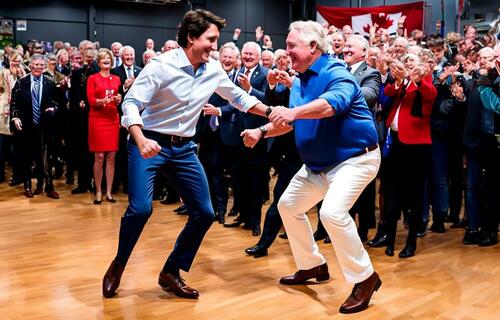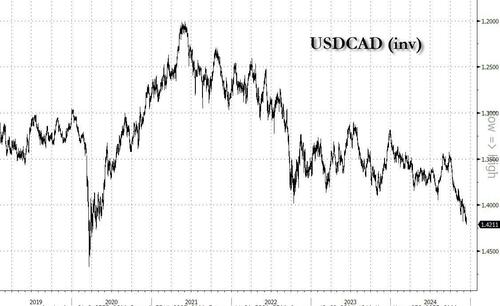In a cute show of strength, Canada has flexed its tiny muscles for a second day in a row and in what it believes is an attempt to intimidate the Trump admin, has threatened to cut off its biggest customer from the one thing that keeps Canada's economy running (hint: it's not illegal aliens or illicit Chinese real estate funs): exports.
According to Bloomberg, Canada is examining the use of export taxes on major commodities it exports to its largest trading partner - the United States - including uranium, oil and potash, to retaliate if incoming president Trump carries out his threat to impose broad tariffs.
Today's threat comes one day after Ontario premier Doug Ford (brother to infamous, and now deceased, Toronto mayor Rob Ford) also flexed what little muscles he has under that copious shell, and suggested that the province would cut off electricity exports to the US over Trump’s tariff threat (which amounts to some 14 million MWh, or enough to power to large data centers).
Citing officials familiar with the discussions inside Prime Minister Justin Trudeau’s government, Bloomberg reports that export levies would be a last resort for Canada. Retaliatory tariffs against US-made goods, and export controls on certain Canadian products, would be more likely to come first.
But commodity export taxes, which would drive up costs for US consumers, farmers and businesses, would be a real option if Trump decides to start a full-scale trade war, said the Bloomberg sources.
The government of Turdeau, who recently hobnobbed with Trump at Mar-A-Lago exuding a self-indulgent smarminess found only among fanatical supporters of Fidel Castro, may also propose giving itself expanded powers over export controls as part of a scheduled update on the country’s fiscal and economic situation to be released on Monday. But since Turdeau's government is already socialist, will anyone know the difference.
Even though the US is essentially self-sufficient, Canada remains the largest external supplier of oil to the US as some refineries depend on buying cheaper Canadian heavy crude and have few alternatives to it (all that would be required to make Canadian oil imports redundant, is a few billion in refinery capex spending). As a result, the US Midwest may be hit by higher costs. Fuel makers in the region rely on Canada for almost half of the crude they turn into gasoline and diesel. Of course, if Canada doesn't export its oil, its economy which is far less diversified, will be hit far harder if it were to voluntarily exclude its largest trading partner.
Canadian uranium is also the biggest foreign source of fuel for US nuclear power plants, and potash from the country’s western provinces is a huge source of fertilizer for American farms. Meanwhile, the US Department of Defense has prudently been investing in Canadian projects to secure sources of cobalt and graphite and reduce reliance on Chinese supply chains.
For those reasons, analysts have said they expect Trump will exempt commodities from his threat to place 25% levies on goods from Mexico and Canada, and focus instead on using tariffs against their manufacturing industries. In Canada’s case, that includes the auto manufacturing, aerospace and aluminum sectors, which are centered in Ontario and Quebec, where about 60% of Canadians live.
It's unclear if that would change things: Turdeau’s government (sic) would have no choice but to respond if Trump simply exempted energy while hitting all other Canadian products, said Bloomberg sources, adding that’s a scenario that could prompt the use of export taxes by Canada.
But for the prime minister, going down this path would cause serious political divisions within Canada. Oil, uranium and potash production are concentrated in the western provinces of Alberta and Saskatchewan. Those provinces are the strongest voter base for Conservative Leader Pierre Poilievre, and their provincial governments are staunch right-wing opponents of Trudeau.
In short, while Turdeau may retaliate in a Trump trade war, such an action will likely be his last.
“It’s a terrible idea,” Alberta Premier Danielle Smith said when asked about the possible use of export taxes.
“I don’t support tariffs on Canadian goods and I don’t support tariffs on US goods because all it does is make life more expensive,” Smith said. “Instead, we’re taking a diplomatic approach and we’re meeting with our allies in the US.”
Saskatchewan Premier Scott Moe said export taxes “are the wrong approach and Saskatchewan will vehemently oppose the federal government imposing export taxes on our potash, uranium or oil.”
The market, however, does not have patience to see how all this plays out, and sent the loonie to a two year low, with the USDCAD surging to 1.420, the highest since the April 2020 depths of the covid crash.
In a cute show of strength, Canada has flexed its tiny muscles for a second day in a row and in what it believes is an attempt to intimidate the Trump admin, has threatened to cut off its biggest customer from the one thing that keeps Canada's economy running (hint: it's not illegal aliens or illicit Chinese real estate funs): exports.
According to Bloomberg, Canada is examining the use of export taxes on major commodities it exports to its largest trading partner - the United States - including uranium, oil and potash, to retaliate if incoming president Trump carries out his threat to impose broad tariffs.
Today's threat comes one day after Ontario premier Doug Ford (brother to infamous, and now deceased, Toronto mayor Rob Ford) also flexed what little muscles he has under that copious shell, and suggested that the province would cut off electricity exports to the US over Trump’s tariff threat (which amounts to some 14 million MWh, or enough to power to large data centers).
Citing officials familiar with the discussions inside Prime Minister Justin Trudeau’s government, Bloomberg reports that export levies would be a last resort for Canada. Retaliatory tariffs against US-made goods, and export controls on certain Canadian products, would be more likely to come first.
But commodity export taxes, which would drive up costs for US consumers, farmers and businesses, would be a real option if Trump decides to start a full-scale trade war, said the Bloomberg sources.
The government of Turdeau, who recently hobnobbed with Trump at Mar-A-Lago exuding a self-indulgent smarminess found only among fanatical supporters of Fidel Castro, may also propose giving itself expanded powers over export controls as part of a scheduled update on the country’s fiscal and economic situation to be released on Monday. But since Turdeau's government is already socialist, will anyone know the difference.
Even though the US is essentially self-sufficient, Canada remains the largest external supplier of oil to the US as some refineries depend on buying cheaper Canadian heavy crude and have few alternatives to it (all that would be required to make Canadian oil imports redundant, is a few billion in refinery capex spending). As a result, the US Midwest may be hit by higher costs. Fuel makers in the region rely on Canada for almost half of the crude they turn into gasoline and diesel. Of course, if Canada doesn't export its oil, its economy which is far less diversified, will be hit far harder if it were to voluntarily exclude its largest trading partner.
Canadian uranium is also the biggest foreign source of fuel for US nuclear power plants, and potash from the country’s western provinces is a huge source of fertilizer for American farms. Meanwhile, the US Department of Defense has prudently been investing in Canadian projects to secure sources of cobalt and graphite and reduce reliance on Chinese supply chains.
For those reasons, analysts have said they expect Trump will exempt commodities from his threat to place 25% levies on goods from Mexico and Canada, and focus instead on using tariffs against their manufacturing industries. In Canada’s case, that includes the auto manufacturing, aerospace and aluminum sectors, which are centered in Ontario and Quebec, where about 60% of Canadians live.
It's unclear if that would change things: Turdeau’s government (sic) would have no choice but to respond if Trump simply exempted energy while hitting all other Canadian products, said Bloomberg sources, adding that’s a scenario that could prompt the use of export taxes by Canada.
But for the prime minister, going down this path would cause serious political divisions within Canada. Oil, uranium and potash production are concentrated in the western provinces of Alberta and Saskatchewan. Those provinces are the strongest voter base for Conservative Leader Pierre Poilievre, and their provincial governments are staunch right-wing opponents of Trudeau.
In short, while Turdeau may retaliate in a Trump trade war, such an action will likely be his last.
“It’s a terrible idea,” Alberta Premier Danielle Smith said when asked about the possible use of export taxes.
“I don’t support tariffs on Canadian goods and I don’t support tariffs on US goods because all it does is make life more expensive,” Smith said. “Instead, we’re taking a diplomatic approach and we’re meeting with our allies in the US.”
Saskatchewan Premier Scott Moe said export taxes “are the wrong approach and Saskatchewan will vehemently oppose the federal government imposing export taxes on our potash, uranium or oil.”
The market, however, does not have patience to see how all this plays out, and sent the loonie to a two year low, with the USDCAD surging to 1.420, the highest since the April 2020 depths of the covid crash.


